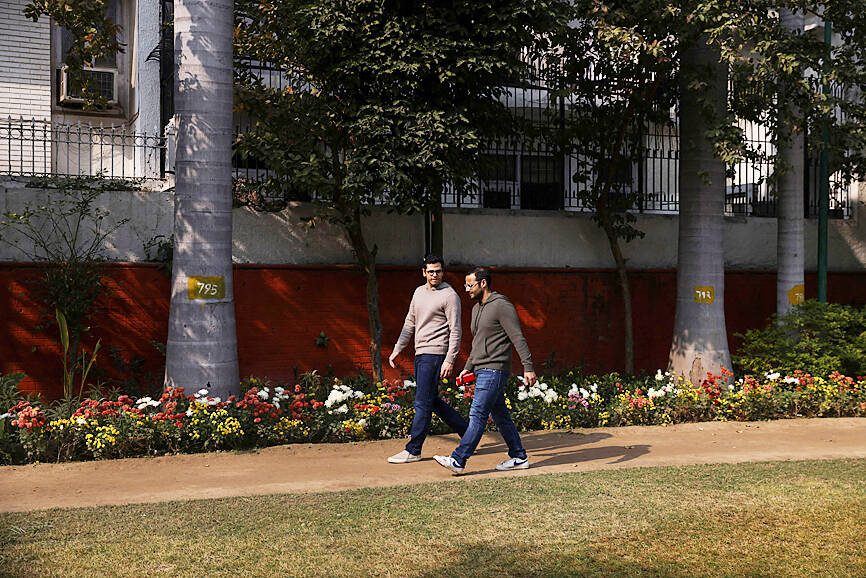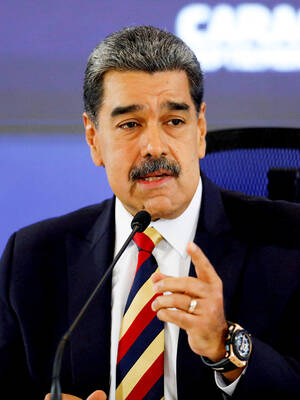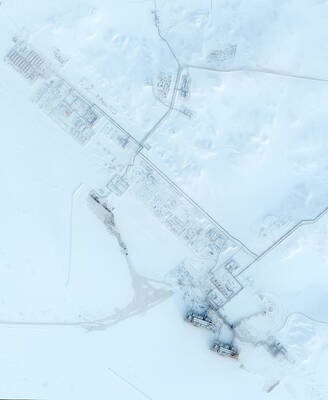Four gay couples have asked India’s Supreme Court to recognize same-sex marriages, setting the stage for a legal face-off with Indian Prime Minister Narendra Modi’s government which has in the past refused to legalize such marriages.
In a historic verdict in 2018, India’s top court decriminalized homosexuality by scrapping a colonial-era ban on gay sex.
Despite the 2018 ruling, members of India’s lesbian, gay, bisexual and transgender (LGBT) community complain about a lack of acceptance and discrimination against gay people in Indian society.

Photo: Reuters
LGBT advocates say that while the 2018 ruling affirmed their constitutional rights, they are still deprived of legal backing for same-sex marriages, a basic right enjoyed by heterosexual married couples.
In three Supreme Court filings seen by Reuters, the couples say that without legal recognition of being married, they are denied rights such as those linked to medical consent, pensions, adoption or even simpler things like club memberships for couples.
Lawyers and a court document confirmed a fourth petition along similar lines was also filed in the court.
“We can’t do so many things in the process of living together and building a life together,” said one of the litigants, businessman Uday Raj Anand, who wants to marry his partner, Parth Mehrotra, chief editor of India’s Juggernaut Books.
Another couple, Supriyo Chakraborty and Abhay Dang, said in their submission that they held a two-day commitment ceremony last year like any other “Big Fat Indian wedding,” but once the euphoria faded, they realized they could not take health insurance as couples or nominate each other in life insurance policies.
“In truth, they have no rights at all,” the filing states.
The four gay couples want a Supreme Court ruling that modifies or interprets laws in a way that allows same-gender marriages, the court filings show.
It is a sensitive subject in the socially conservative country of 1.4 billion people, where speaking openly about homosexuality is taboo for many.
The pleas have already triggered a debate on prime-time TV news and generated editorials in newspapers whether the time has come for the world’s largest democracy to join about three dozen countries where such marriages are legal.
The Indian Supreme Court cases, which follow many lawsuits filed in lower courts where no decision was reached, will be a key test for Modi’s Hindu nationalist government and his allies.
A lawmaker from Modi’s party yesterday appealed to colleagues in the upper house of parliament to oppose legal recognition of marriage between same-sex couples.
“Same-sex marriage will cause havoc with the delicate balance of personal laws in the country... Two judges cannot take a decision on this social issue,” said Sushil Modi, a lawmaker from the ruling Bharatiya Janata Party.
“Parliament and society must debate it,” he said.
The Supreme Court has given the government until Jan. 6 to submit its responses.

VENEZUELAN ACTION: Marco Rubio said that previous US interdiction efforts have not stemmed the flow of illicit drugs into the US and that ‘blowing them up’ would US President Donald Trump on Wednesday justified a lethal military strike that his administration said was carried out a day earlier against a Venezuelan gang as a necessary effort by the US to send a message to Latin American cartels. Asked why the military did not instead interdict the vessel and capture those on board, Trump said that the operation would cause drug smugglers to think twice about trying to move drugs into the US. “There was massive amounts of drugs coming into our country to kill a lot of people and everybody fully understands that,” Trump said while hosting Polish President

Japan yesterday heralded the coming-of-age of Japanese Prince Hisahito with an elaborate ceremony at the Imperial Palace, where a succession crisis is brewing. The nephew of Japanese Emperor Naruhito, Hisahito received a black silk-and-lacquer crown at the ceremony, which marks the beginning of his royal adult life. “Thank you very much for bestowing the crown today at the coming-of-age ceremony,” Hisahito said. “I will fulfill my duties, being aware of my responsibilities as an adult member of the imperial family.” Although the emperor has a daughter — Princess Aiko — the 23-year-old has been sidelined by the royal family’s male-only

A French couple kept Louise, a playful black panther, in an apartment in northern France, triggering panic when she was spotted roaming nearby rooftops. The pair were were handed suspended jail sentences on Thursday for illegally keeping a wild animal, despite protesting that they saw Louise as their baby. The ruling follows a September 2019 incident when the months-old feline was seen roaming a rooftop in Armentieres after slipping out of the couple’s window. Authorities captured the panther by sedating her with anesthetic darts after she entered a home. No injuries were reported during the animal’s time on the loose. The court in the

Another tanker carrying liquefied natural gas from Russia’s sanctioned Arctic LNG (liquefied natural gas) 2 project has docked in a Chinese port, ship-tracking data showed, days after Russian President Vladimir Putin met Chinese President Xi Jinping (習近平) in Beijing. The London Stock Exchange Group (LSEG) tracking data indicated the Russian Voskhod LNG tanker was anchored at an LNG terminal in the port of Tieshan in Guangxi, China. The Russian flagged tanker, with a cargo of 150,000 cubic meters of LNG, was loaded up at the Arctic LNG 2 facility in Gydan in northern Siberia on July 19, LSEG data showed.